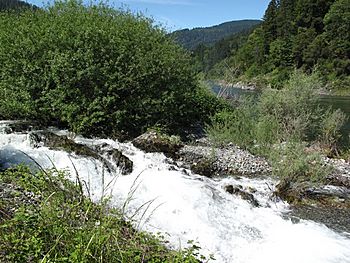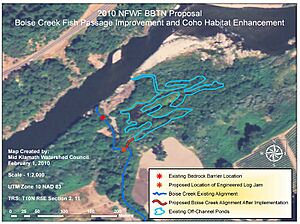Boise Creek facts for kids
Quick facts for kids Boise Creek |
|
|---|---|

Bedrock Falls blocks salmon passage up Boise Creek from the Klamath River
|
|
| Country | United States |
| State | California |
| Region | Humboldt County |
| Physical characteristics | |
| Main source | Orleans Mountain 4,560 ft (1,390 m) 41°15′54″N 123°26′43″W / 41.26500°N 123.44528°W |
| River mouth | Confluence with the Klamath River 2.25 miles southeast of Orleans, California 320 ft (98 m) 41°16′56″N 123°34′35″W / 41.28222°N 123.57639°W |
| Basin features | |
| Tributaries |
|
Boise Creek is a small stream in Humboldt County, California, United States. It begins high up on Orleans Mountain. The creek flows for about 8.5 miles. It then joins the larger Klamath River near Orleans, California. This area is part of the beautiful Six Rivers National Forest. Boise Creek is an important part of the Lower Klamath River Watershed.
Contents
Salmon and Their Challenges
Salmon are very important fish in the Klamath River area. Their numbers have dropped a lot. This is due to several problems. These include too many nutrients in the water, warmer water, and less water flowing. Dams built on the river have also caused issues. They block salmon from reaching over 300 miles of their natural spawning grounds. Spawning grounds are where fish lay their eggs.
Protecting Coho Salmon
One type of fish, the Coho salmon, is especially at risk. These salmon are found along the Southern Oregon - Northern California Coast. They are listed as "threatened" by the United States government. The California Department of Fish and Game also listed them as threatened in 2002. This means they need special protection to survive.
How Beavers Helped Salmon
For a long time, salmon could not swim up Boise Creek. A natural waterfall made of bedrock, about 13.5 feet high, blocked their way. This waterfall was very close to where the creek meets the Klamath River.
A Plan to Help Fish
In 2010, a group called the Mid Klamath Watershed Council had an idea. They wanted to build a special logjam. This logjam would redirect the creek's water. It would create new paths around the waterfall. This way, salmon could swim into Boise Creek again.
Beavers Build a Solution
Before the group could build their logjam, something amazing happened. Beavers built their own dam in Boise Creek. They built it at the exact spot where the logjam was planned. This natural beaver dam changed everything.
New Homes for Salmon
Now, many different salmon can get into Boise Creek. These include Coho salmon, Chinook salmon, and Steelhead trout. The beaver dam has opened up several miles of new habitat for these fish. This means more places for them to lay their eggs and raise their young.
Benefits of Beaver Dams
The beaver dam also created calm ponds next to the main creek. These ponds are very helpful for young salmon. They offer a safe place for fish to hide when the main river flows too fast. These ponds also provide good places for young salmon to grow during the summer. Studies have shown that Coho salmon numbers can increase a lot in these areas. Chinook salmon also grow bigger and survive better in these off-channel wetlands.


